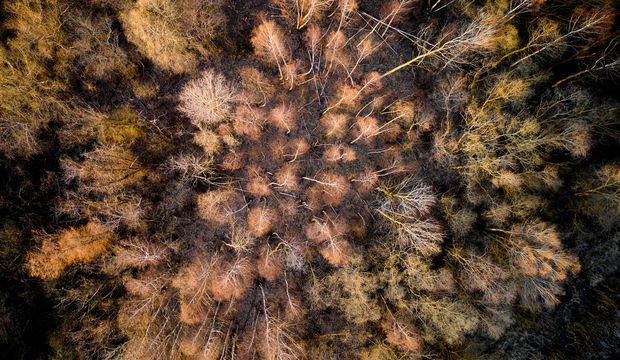There is a longish story I like a lot.* I wrote a series about this story and its insight nearly two years ago. A part of this series is so related to the period we are in that I want to reinterpret it.
A boy who practices deep listening in a forest for seven years through the instruction of a shaman starts to hear a voice coming from far away, a female voice after seven years. The woman says: “I am your wife. I am coming”. He keeps hearing this voice for a few days. Then, he sees a canoe in the river where there are six other women with this woman more beautiful than one another. However, he notices that there is a shrewish mother-in-law riding the canoe at the back of it. As the story goes on, the mother-in-law gets him into a lot of trouble (I am cutting this part short), but the strong, good listener and brave shaman gets lucky until he needs to pass through a forest. Only then does the woman he likes warn him and says: “While you go on your way in the forest, you will go through a very tall structure. There will be noises from everywhere to attract your attention, but I warn you: NEVER look at the noises. NEVER AND EVER”.
The young man walks taking what she says in his pocket and he arrives at the place the woman warns him about. A structure like a long corridor he needs to pass through. He starts to walk. There are voices calling him from all around, but he looks at none until he hears a beautiful female voice. In the end, he can’t resist the urge to see the owner of the voice, but as soon as he looks in that direction, he loses his eye-sight. He no longer has his eyes.
He proceeds on his way, but life is not what it used to be any longer. He can’t see anything. He doesn’t have a vision.
The story is multi-layered, but the message in this part asks us; With the energy our youth provides us with, we can get lucky for some time in life, but then, where do we get distracted on life way and lose our eyes?
The things we know we shouldn’t do deep down inside, but we do make us lose some parts of our souls. The eyes are the windows of the soul, aren’t they? The story tells this.
Francis Weller, who has many valuable books and speeches about grief, defines the current cultural era as “Forgetting and Anaesthesia Period” like that: forgetting who we are and our birth rights and in order to stay in this forgetting and anaesthesia situation, numb ourselves in a number of ways.
Well then, how does this forgetting and anaesthesia situation happen? I am born into a body and a family. That family is a part of a community, which is a part of larger one, which is a part of the cosmos. The community we are born into has the responsibility of teaching us the bond we have with the cosmos and our responsibilities to it because only in this way is it possible for us to grow up and live knowing that we are a part of the world and a bigger whole.
Is that right?
For sure it isn’t. That’s why; we live in a state of emptiness and grief. Are we aware that we are in grief, you guys? Do we see our grief?
I am in grief; for my lack of understanding and skill about building a respectful relationship with the earth, for having no community, for the consequences of being brought up without the support of my community, for my efforts to be self-sufficient, the loneliness and exhaustion due to attempting to find my place in the universe using my intuition and the state of the world as a result of all of these.
Stephen Jenkinson says:
“ What modern Western people suffer from most is culture failure, amnesia of ancestry and deep family story, phantom or sham rites of passage, no instruction on how to live with each other or with the world around us or with our dead or with our history. The relentless pursuit of self-reliance and self-improvement is rooted in our lost connection to common stories, homeland and ancestors that bind and unite us. The times now demand that we recognize the world’s suffering in our own.”
Because we live without seeing this state of failure and accepting our grief, our most fragile pains are, in fact, about “not being able to live”. The reason for this is that we were born in this era and got stuck in the voices around and lost our eyes. We lost our vision and our competence to see our place in the universe.
There we are…we could start giving a meaning to death and grief viewing them from here since death and grief are such mysterious and compelling events that they force us to look at life differently and even to realize our deprivation. Death feeds life like our cells dying and rejuvenescencing every seven years or digesting the food we eat, in a way, killing it and throwing out the useless part. Similarly, grief takes us to places we have never been before, makes us lose ourselves and gets us to pass sorrowful paths to enable us to meet our true nature.
As a matter of fact, we talk about these since we have lost our eyes.
We cannot take back our eyes without living more, being aware of our feelings, being more fragile, attaching more to life, talking to the nature more, respecting it, remembering more that we are part of the universe and we have a bond, loving more, listening to more.
There is a place I like very much in Filiz Telek’s book “Kadınlar Şifadır”:
“Once I felt hopeless about lost traditions, practices and wisdom. However, I know that there is a different option:
…When we eventually lift our heads away from the white screen, if we meet the troubles and the poverty of the current time closely and allow our hearts to break, maybe then, we have the room and our consent to be remembered and owned by the old, the wise, the patient and the compassionate. I hope we are not too late to be found and embraced.”
In one part of the story, the young man without his eyes starts to use the eyes of the animals. What is told here is that when we have difficulty seeing, we can ask for help and borrow vision. Francis Weller, Stephen Jenkinson, Filiz Telek, tales, poems, circles each are eyes for us.
My prayer is that may our states of being able to build relationships with our griefs be each other’s eyes. Amen.
* Martin Shaw tells this story. Its name is “Listener”. It is in 4 episodes on YouTube for the ones who can follow it in English.
Yazının Türkçe versiyonu: Gözlerimizi kaybettiğimizden





YORUMLAR